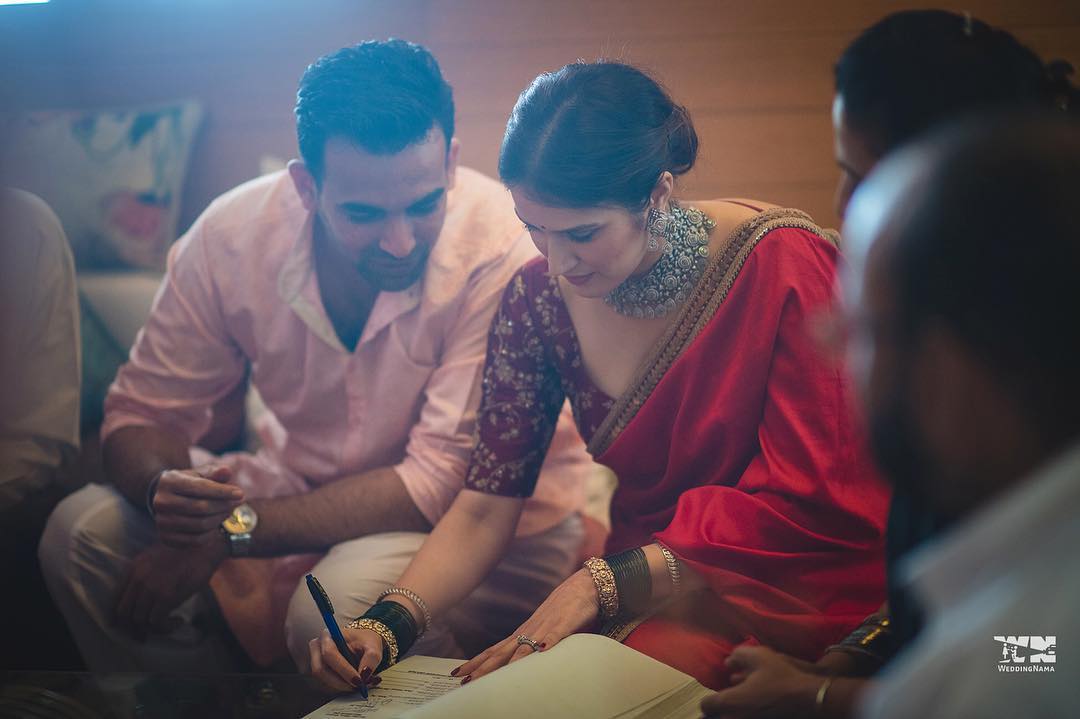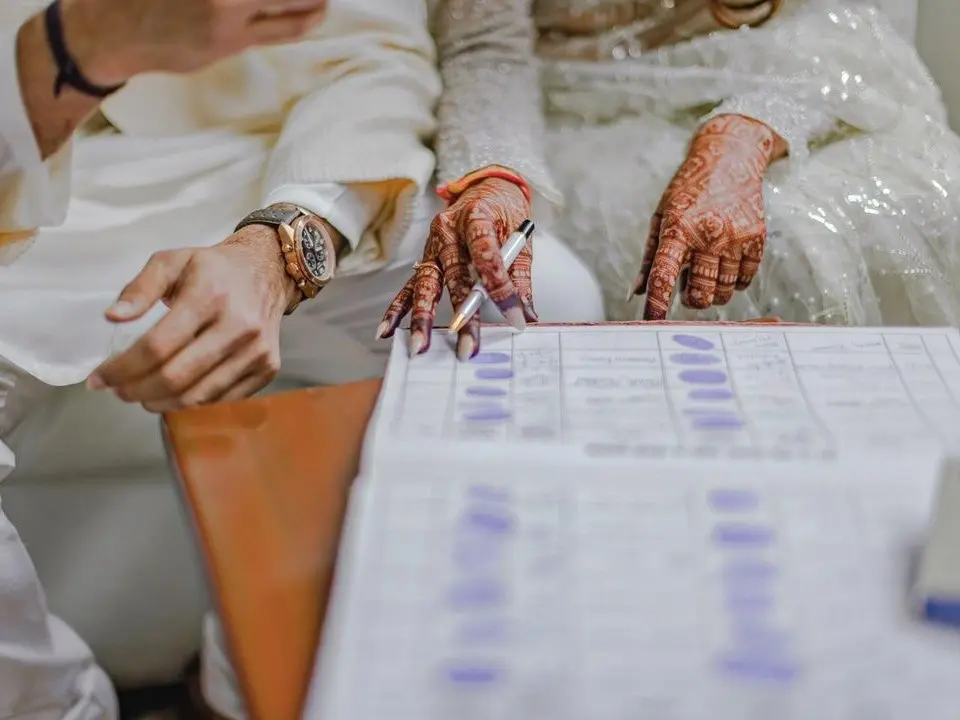From Process To Fees: Step-By-Step Guide About Court Marriage In India
Originally Published on ShaadiWish
With every passing year, many couples are opting out of grand five-day weddings and picking the simple route of court marriage. Court marriages in India take place under the Special Marriage Act, 1954. Under this act, a marriage can be solemnized in the court in the presence of three witnesses and a sub-registrar who is appointed under this act. If a couple decides to get married in court, there is no discrimination based on color, caste, creed, religion, etc. A court marriage means solemnizing the marriage according to law. If you are considering having a court wedding but are unaware of the procedure, then ShaadiWish has got you a step-by-step guide to follow.
Disclaimer: There is a lot more than just signing a piece of paper and being pronounced as a man and wife.
Here Is Everything You Need To Know From Process To Fees About Court Marriages In India:
Eligibility And Rules Of Court Marriage In India
The process of court marriage in India is standard across the nation. There are certain sets of rules and eligibility criteria for you to have court marriage in India. Here are some eligibility criteria listed below for you:
- Both parties should not have lived as husband and wife at the time of the court marriage.
- The bride has to be at least 18 years of age, while the groom should be at least 21 years of age.
- Both the bride and groom should not be of unsound mind at the time of the court marriage.
- They both should be able to give valid consent at the time of the marriage.
- Neither of the parties should have a living spouse at the time of applying for court marriage.
- At the time of court marriage, both the bride and groom should not suffer from any mental disorder or insanity.
- Both the parties should not be within the degree of prohibited relationship. In other words, court marriage can occur with a prohibited relationship if their custom favors doing so.
- Both parties are fit for the procreation of children.

Take A Note Of These 12 Basic Rights That Every Indian Woman Should Be Aware Of.
Documents Required For Court Marriage In India
If you are not carrying the necessary documents, the process of court marriages can become long and tedious. Make a note of these necessary documents beforehand. It is also ideal to carry the original copies of these documents and xerox and scanned copies of the documents to avoid any last-minute mishaps.
- The application form, also make sure that it is signed by both parties.
- Age proof of both the parties. (Birth certificate, Passport, PAN card, or Matriculation certificate)
- Residential proof of both the parties. (Voters ID, Passport, Electricity bill, Gas bill, or Ration card in the parties’ name)
- Receipt of payment of marriage application form in the District Court and other marriage-related fees.
- Two passport-sized photographs each of the bride and the groom.
- Confirmation on the parties, not falling within degrees of prohibited relation of each other.
- If you are not applying from your permanent place of residence, then in such cases, the residential proof is needed. You can present either the ration card or a report from the Station House Officer.
- In the case of divorcees, a divorce decree certificate is compulsory.
- In the case of a widow or widower, a Municipal death certificate of the deceased is compulsory.
- Affidavits from both the parties regarding their date of birth, current marital status (unmarried/divorced/widowed)

Top stylish ideas for court wedding outfits for the millennial brides.
Documents Required For Witnesses
A family member, friend or a colleague, can be a witness to a court marriage. However, document requirements don’t stop just at the bride and groom, even the witnesses need to carry specific documents to sign. Mentioned below is the list of the documents required for being a witness in court:
- Voter’s ID
- Driving license
- Passport (optional)
- Ration card of the witness
Step-By-Step Procedure For Court Marriages
Step 1: Notice Of Intended Marriage
The first step is acquiring the notice of the intended marriage. The parties (bride and the bridegroom) have to send a written notice to the marriage registrar showing the intention that the parties want to marry each other. The notice of the intended marriage should be given as prescribed in the second schedule of the Act before 30 days of the intended marriage date. The marriage registrar should be from the area where either of the party resides in or have lived for at least 30 days.
Step 2: Publication Of The Notice
The notice sent to the office of the marriage registrar will be published by the marriage officer by affixing it to a place in his office. From the date of publishing to the 30th day, anyone can object to this marriage and if there is no objection, the marriage will be allowed to happen. After the 30th day, the marriage officer will perform the marriage in the office.
Step 3: Objection To Marriage (If Applicable)
In case someone objects to the marriage within the 30-day period, an enquiry is conducted by the marriage officer within 30 days of the receipt of the objection. A person can submit an objection on the grounds that the marriage violates specific conditions of eligibility required for the court marriage. However, the objection to the marriage should be on a legal basis and not on a personal basis. After enquiring about the objection, the marriage officer can solemnize the marriage when it does not violate any conditions for marriage.
Step 4: Declaration By Parties And Witnesses
According to the court marriage process, the couple-to-be married and 3 witnesses must be present at the registrar’s office on this day to submit a declaration. They must declare that they are being the witnesses or getting married with free consent.
Step 5: Place And Form Of Solemnization
The couple can choose any place to get married. It can take place at the office of the marriage officer or another place within a reasonable distance which the parties choose. If the couple choose to get married someplace else, they must also pay a prescribed fee to the marriage officer.
Step 6: Procedure For Marriage Certificate
Once the solemnization of the marriage takes place according to the rules and regulations of Court Marriage, the marriage registrar gives the couple the marriage certificate. Both the parties to the marriage and three witnesses must sign the marriage certificate and is then treated as evidence of marriage thereon. It can even be downloaded online later.

Court Marriage Certificate Fees
Court marriage in India has different fees criteria. However, the usual court marriage fee varies between INR 500 to INR 1,000. It has to be submitted at the marriage registrar’s office at the time of applying for a court marriage.

Advantages Of Court Marriage:
- It is highly economical.
- A quick, stress-free and simpler process.
- Saves the huge expenses of traditional wedding rituals and ceremonies.
- The parties to the marriage get the option of solemnizing the marriage in any way they want without bring the caste/religion/creed/color aspect into the picture.
- It ensures the consent of both the parties.
- The marriage certificate issued by the marriage officer is a legal proof of the marriage.

P.S. End your search for the best bridal wear near you with ShaadiWish!


Comments
Post a Comment